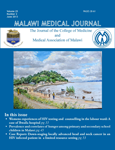
|
Malawi Medical Journal
College of Medicine, University of Malawi and Medical Association of Malawi
ISSN: 1995-7262
Vol. 29, No. 1, 2017, pp. 53-54
|
 Bioline Code: mm17010
Bioline Code: mm17010
Full paper language: English
Document type: Report
Document available free of charge
|
|
|
Malawi Medical Journal, Vol. 29, No. 1, 2017, pp. 53-54
| en |
Assessing the feasibility of mobile phones for followup of acutely unwell children presenting to village clinics in rural northern Malawi
Hardy, Victoria; Hsieh, Jenny; Chirambo, Baxter; Wu, Tsung-Shu Joseph; O’Donoghue, John; Muula, Adamson S. & Thompson, Matthew
Abstract
Background
Patient follow-up is a routine component of clinical practice and valuable for evaluating the effectiveness of interventions, but because of the broad
dispersion of health facilities and lack of standardised medical reporting in Malawi, collecting patient outcome data can be challenging. Increasing
accessibility and affordability of mobile technology in resource-poor settings may facilitate patient follow-up in the community. The objective of this
study was to evaluate the potential utility of mobile phones for collecting follow-up clinical data from parents or caregivers of acutely unwell under-5
children, for intervention evaluation purposes.
Methods
Parents’ or caregivers’ mobile phone numbers were obtained by health surveillance assistants (HSAs) during study enrollment. Guardians who provided
a telephone number were contacted by the study team to establish re-consultations or hospitalisations of their child(ren) within 14 days of recruitment.
Health records at village clinics and higher-level health facilities were hand-searched to identify or confirm presentations and abstract clinical data.
Results
87 out of 149 (58.4%) guardians provided a mobile telephone number, of whom the study team could contact 44 (29.5%). Seven guardians stated they
took their child for further treatment: three of these returned to village clinics and four presented to secondary care facilities; attendance could only be
confirmed from health records for one child.
Conclusions
With continued expansion of cellular network coverage and mobile ownership in Malawi, mobile phones may facilitate collection of patient outcomes
for intervention evaluation purposes. Future consideration should also be given to integrating mobile technologies into HSA clinical practice.
|
| |
© Copyright 2017 - Malawi Medical Journal
Alternative site location: http://revista.uft.edu.br/index.php/jbb/index
|
|
